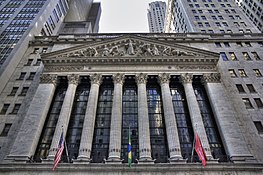
Back Aandelebeurs Afrikaans سوق الأوراق المالية Arabic Bolsa de valores AST Fond birjası Azerbaijani Akcėju bėrža BAT-SMG Фондавая біржа Byelorussian Фондавая біржа BE-X-OLD Фондова борса Bulgarian Borsa Catalan بازاڕی کاغەزە داراییەکان CKB
| Part of a series on |
| Financial markets |
|---|
 |
| Bond market |
| Stock market |
| Other markets |
| Over-the-counter (off-exchange) |
| Trading |
| Related areas |

A stock exchange, securities exchange, or bourse is an exchange where stockbrokers and traders can buy and sell securities, such as shares of stock, bonds and other financial instruments. Stock exchanges may also provide facilities for the issue and redemption of such securities and instruments and capital events including the payment of income and dividends. Securities traded on a stock exchange include stock issued by listed companies, unit trusts, derivatives, pooled investment products and bonds. Stock exchanges often function as "continuous auction" markets with buyers and sellers consummating transactions via open outcry at a central location such as the floor of the exchange or by using an electronic trading platform.[2]
To be able to trade a security on a particular stock exchange, the security must be listed there. Usually, there is a central location for record keeping, but trade is increasingly less linked to a physical place as modern markets use electronic communication networks, which give them advantages of increased speed and reduced cost of transactions. Trade on an exchange is restricted to brokers who are members of the exchange. In recent years, various other trading venues such as electronic communication networks, alternative trading systems and "dark pools" have taken much of the trading activity away from traditional stock exchanges.[3]
Initial public offerings of stocks and bonds to investors is done in the primary market and subsequent trading is done in the secondary market. A stock exchange is often the most important component of a stock market. Supply and demand in stock markets are driven by various factors that, as in all free markets, affect the price of stocks (see stock valuation).
There is usually no obligation for stock to be issued through the stock exchange itself, nor must stock be subsequently traded on an exchange. Such trading may be off exchange or over-the-counter. This is the usual way that derivatives and bonds are traded. Increasingly, stock exchanges are part of a global securities market. Stock exchanges also serve an economic function in providing liquidity to shareholders in providing an efficient means of disposing of shares.
- ^ Kat Tretina and Benjamin Curry (9 April 2021). "NYSE: What Is The New York Stock Exchange". Forbes. Archived from the original on 23 June 2022. Retrieved 25 July 2022.
- ^ Lemke and Lins, Soft Dollars and Other Trading Activities, §2:3 (Thomson West, 2013-2014 ed.).
- ^ Lemke and Lins, Soft Dollars and Other Trading Activities, §§2:25 - 2:30 (Thomson West, 2013-2014 ed.).
© MMXXIII Rich X Search. We shall prevail. All rights reserved. Rich X Search